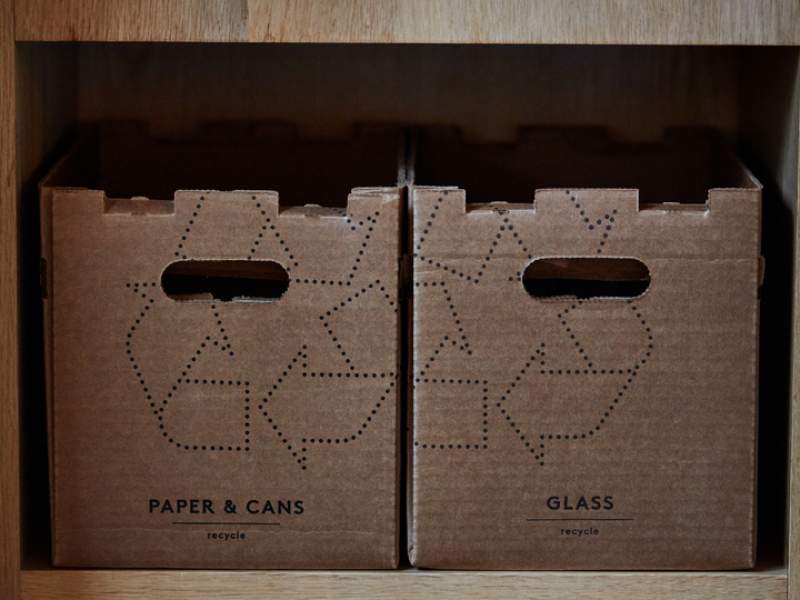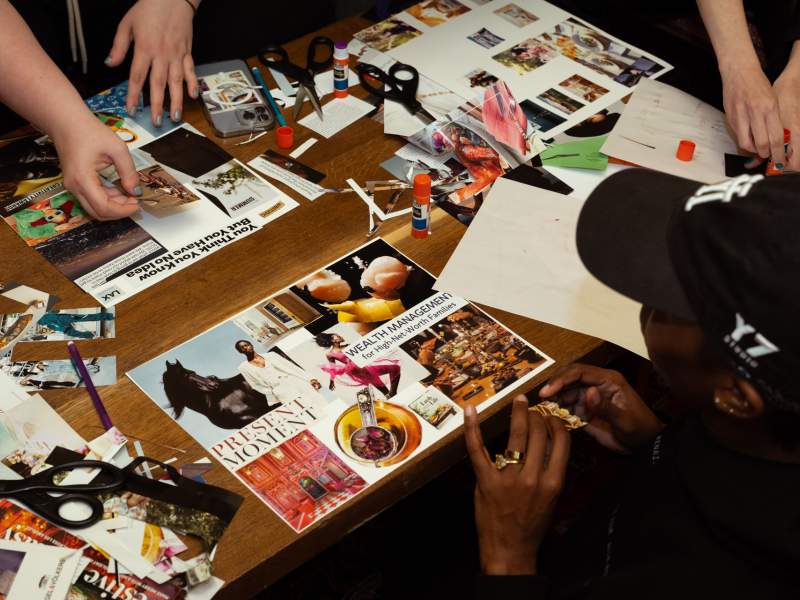Recycling Throughout the Years: Why It's Still as Important as Ever
The topic of recycling generates a lot of mixed messages. Is it actually important? Is it making a difference? Are you doing it right? We’re here to set the record straight—and lead by example.

While curbside recycling has been a part of our lives for nearly 30 years, there are so many mixed messages about its purpose and importance in our society. With rules and restrictions varying from country to country, state to state, city to city, it’s a topic that generates a lot of second-guessing.
Is it actually important? Is it making a difference? Am I doing it right?
As a company that focuses a lot of time, energy, and resources on responsible waste management, we understand the confusion and overwhelm. That’s exactly why we want to revisit the basics of recycling and refresh the way we all think about it. To do so, it’s important to recognize (and draw inspiration from) what recycling has accomplished.
- It’s estimated that 95% of textiles can be recycled. This is huge since we consume 62 million tons of textiles globally per year.
- It’s estimated that 75% of all aluminum ever produced is still in use today. Every single recycled aluminum can saves enough energy to power a TV for three hours.
- Recycling one glass bottle can save enough energy to power a light bulb for four hours, while that bottle would take a million years to decompose in a landfill.
- Steel cans are the most recycled form of packaging in the world, and using recycled steel saves enough energy to power 18 million homes for one year.
- In 2017, one million tons of consumer electronics were recycled in the U.S. alone.
- Every ton of recycled paper can save 17 mature trees from being cut down.
Even with all of these exciting statistics, only a mere 13% of global municipal solid waste is actually recycled. Quite frankly, we need to do better, and that starts with all of us remembering the importance of a “reduce, reuse, recycle” mindset.
Reduce, Reuse, Recycle
“Reduce, reuse, recycle” is not just a slogan for recycling programs—it’s an order of operations. Some people and organizations passionate about waste management (which we love) have even amended this order to “refuse, reduce, reuse, repurpose, recycle,” emphasizing the fact that we can do more to reduce waste.
STEP 1: Refuse & Reduce
In other words, train your mind to recognize the situations where you can simply use less. At 1 Hotels, we embrace this mindset by recognizing the beauty in simplicity—that happiness comes from within and is nurtured by our natural surroundings, rather than material things.
In fact, minimalism is known to bring more intention into your life, save you time and money, reduce your anxiety, minimize the urge to compare yourself to others, improve your relationships, and inspire you to measure value in more meaningful ways.
STEP 2: Reuse & Repurpose
When you do decide to purchase new goods, it’s important to focus on the longevity of the item, starting at the point of consumption.
Let’s use clothing as an example. These days, the average lifetime of an article of clothing is less than three years. Meanwhile, textiles can take up to 40 years to decompose in a landfill! A study done in the UK reveals that if you keep your clothes for just nine months longer, you could reduce their environmental impact by 30%.
It can be easy, fun, and rewarding to keep your clothes circulating—by donating them, upcycling them, or doing clothing swaps with your close friends. And always remember, seeking cheap, trend-driven garments from fast fashion brands comes at a much higher price for the planet and people.
STEP 3: Recycle
When you decide it’s time to dispose of something, consider its recyclability. This part can be tricky because recycling methods and requirements vary from place to place and are subject to change.
To get you started, here are a few types of recycling to keep in mind.
- Curbside Recycling: Get to know your local facility, since their methods will depend on their equipment, funds, and more. Note that many local recycling centers will not accept small items (e.g. plastic items that are 3 inches or smaller). Be sure to search “What can I recycle in [your city]?”
- Composting: Roughly 94% of food waste ends up in landfills, where it rots and emits greenhouse gasses. Composting is a way to use food waste to nourish healthy soil.
- Textile Recycling: Resell, donate, exchange, and/or upcycle your clothes. After that, contact your local recycling facility to see if they accept textiles. If they don’t, seek advice from a third-party organization like ATRS (US), Waste Nothing (Canada), or Recycle Now (UK).
- Electronic Recycling: Trade in your devices and/or recycle electronic waste (batteries, broken devices, etc.) by searching “electronic recycling near me.”
- Furniture Recycling: Consider donating lightly or moderately used furniture to a local thrift store and/or search “furniture recycling near me” to find companies that will accept (and even pick up) your old furniture.
It may seem overwhelming at first, but once you get into your local recycling groove, it should become second nature.
Recycling, Throughout the Years
For the World
For some motivation, let’s see how recycling has progressed throughout the years.
- Pre-1990: Recycling scrap materials (metal, paper, rubber, twine, household items, etc.) was essential to survival after the World Wars. This showed people first-hand how recycling could save resources and money.
- The 1990s: Curbside recycling booms, but methods and capabilities are limited and very financially driven.
- Early 2000s: Environmental agencies emphasize the role of recycling in the fight against global warming. The mindset around recycling begins to shift from financial to environmental.
- Mid 2000s: Leaders in technology stress the importance of e-waste recycling. Free recycling services and trade-in offers incentivize the public. Rising awareness about the environmental impacts of the fashion industry depict the need for textile recycling.
- 2020: Essential recycling programs face closure across the globe. China’s bans on various categories of recycling imports cripple other nations’ recycling systems. The impacts of COVID-19 are catastrophic for an already vulnerable recycling system.
The truth is, global recycling systems are suffering at the time we need them the most. As new reports discuss the vulnerability of our planet—and the lead role that we, as humans, play in the detriment—we need the “reduce, reuse, recycle” mentality now more than ever.
For 1 Hotels
Responsible waste management has always been at the forefront of our operations. But that doesn’t mean we don’t run into our own challenges, as recycling regulations and capabilities vary so much across our locations.
Below you can take a peek inside our efforts to reduce, reuse, and recycle.
- Plastic: We’ve worked hard to eliminate plastic wherever possible across our properties — from eliminating plastic hangers, cups, water bottles, keycards, and to-go containers to rethinking which items truly need packaging at all. You can bet that if you see plastic at our properties, we are actively working to source an alternative. We also gift reusable water bottles to our 1 Hotels team members, and at certain properties, we reuse crates from our food and beverage vendors. In place of plastic, we use recycled-wood room keys and recycled-paper hangers. All remaining plastic waste is recycled across all properties.
- Food & Organics: We work to reduce food waste at the source, partnering with local purveyors and placing mindful orders. At 1 Hotel Brooklyn Bridge, we track food waste, use the Too Good To Go app to upcycle excess food (saving ~100 meals per month!), and recycle oyster shells via the Billion Oyster Project. Across all hotels, we work with local composting facilities or utilize on-site composters.
- Glass: We repurpose glass as sandbags and pool filters. At many of our properties, glass is accepted in recycling, but it’s not actually recycled. We’re working with local facilities to find better glass hauling/reuse options. In Toronto, we have an on-site glass crusher that turns glass waste into sand for soil aeration.
- Paper & Wood: We recycle paper and cardboard at all of our locations, and we even have an on-site baler at 1 Hotel Toronto, 1 Hotel South Beach and 1 Hotel West Hollywood. At certain locations, we’re still working to optimize cardboard recycling, so the material retains its value. We also use reclaimed wood and other natural resources (for design and in-room touches) whenever possible.
Our newest urban sanctuary, 1 Hotel Toronto, sets the stage for waste diversion. You can read more about its innovative zero-waste initiative here, and we continue to use it as a model for waste diversion at all of our sanctuaries.
Moving Forward
In order to make the most of your recycling resources, we recommend making a cheat sheet of approved methods in your area. To get you started, here are a few questions you can use to begin filling out your cheat sheet.
- Can you recycle styrofoam?
- Can you recycle pizza boxes?
- Can you recycle plastic bags?
- Can you recycle bubble wrap?
- Can you recycle glass?
There’s no one-size-fits-all answer to these questions; they vary as some facilities expand their operations while others face the difficult decision to restrict. In addition to contacting your local facilities, you can use online databases like How2Recycle and Earth911 to locate facilities in your area that will accept specific items such as paint, garden items, batteries, and more.
If you’ve made it this far and you’re still feeling discouraged and/or overwhelmed, we’ll leave you with this lingering thought. It’s estimated that over the next 30 years, recycling will reduce carbon dioxide emissions by roughly six gigatons—the equivalent of taking over one billion cars off the road for one year.
We hope you find comfort knowing that all of your recycling efforts are actually making a difference.












